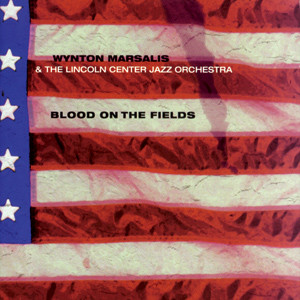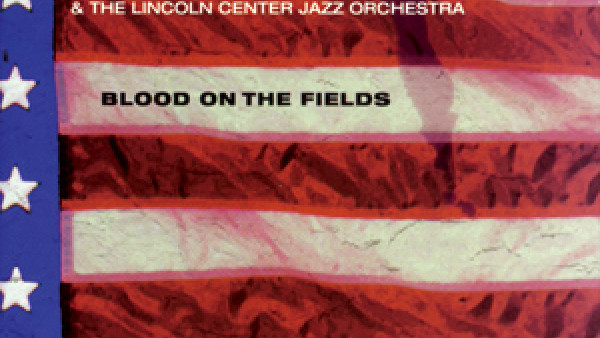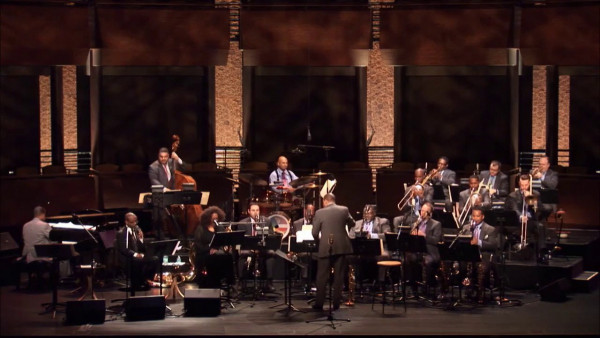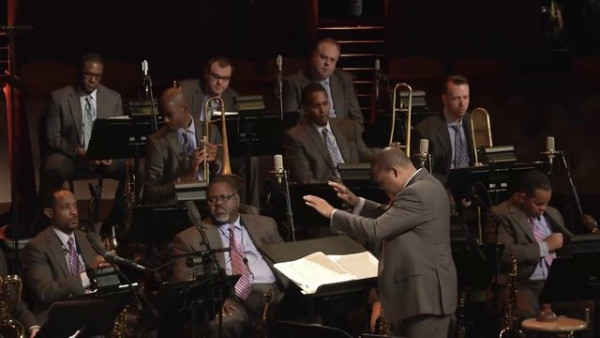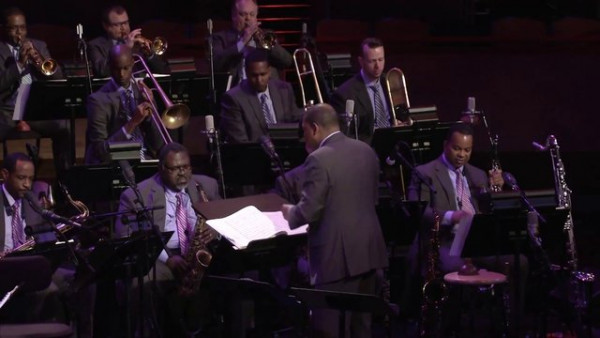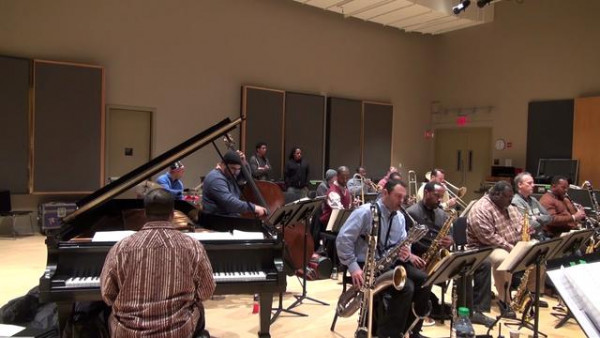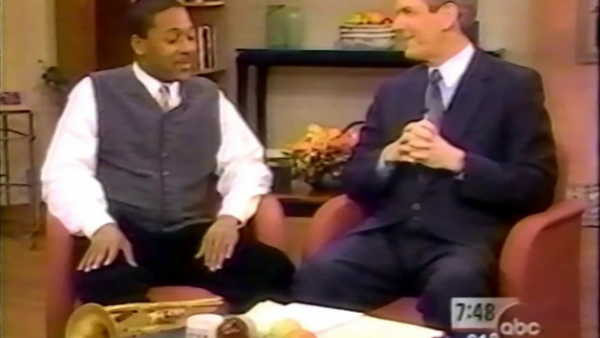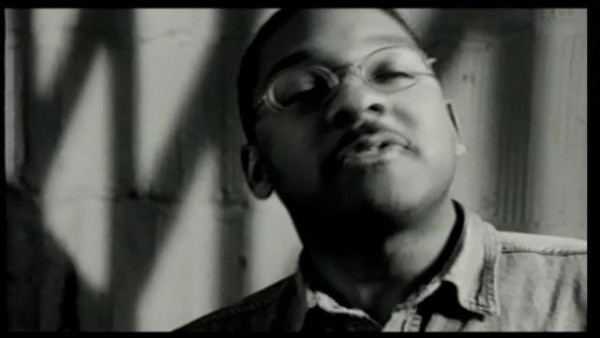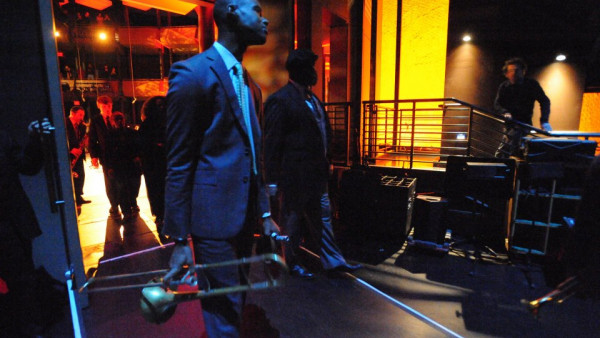The Story Behind the First Pulitzer for Jazz
How Wynton Marsalis’s 1997 win moved the Music Pulitzers beyond the classical canon.
It was a moment that many thought never would happen.
In 1997, for the first time in the history of the Pulitzer Prize in Music, the award went to a genre intimately bound up with the cultural, social and racial history of this country: jazz. Wynton Marsalis’s “Blood on the Fields,” an epic vocal-orchestral suite that dealt head-on with the tragedy of slavery, became not only the first jazz work to take the highest honor in American music but the first non-classical piece ever to win.
Since the inception of the prize in 1943—when composer William Schuman received the award for “Secular Cantata No. 2, A Free Song”—every Pulitzer-winning composition spoke in the language of European-derived, Western classical music. As for jazz, blues, gospel, country, spirituals, and every other genre the United States gave to the world, all had been excluded. Completely.
This caused a contretemps in 1965, when a certifiable jazz genius—Duke Ellington—was denied a special citation the jury had recommended to the Pulitzer board. The subsequent and continued exclusion of jazz, often cited as America’s greatest cultural invention, disturbed some Pulitzer board members and distant observers alike. But it took years of effort, hand-wringing, argument, and public discourse to change the trajectory of the music Pulitzer in 1997. When jazz experimenter Henry Threadgill won a Pulitzer this year for “In for a Penny, In for a Pound,” the double CD recorded with his band Zooid, the triumph represented just the most recent development in a campaign that had begun in earnest in the early 1990s.
“At some point, the board began to worry that the diversity of music—American music—that was being offered to us was awfully narrow,” says Jack Fuller, the former president of Tribune Publishing who had joined the Pulitzer board in 1991. A jazz connoisseur, trombonist, and pianist who would go on to write the critically applauded jazz novel “The Best of Jackson Payne,” Fuller came onto the board with no agenda but knew the sorry history of jazz and the Pulitzers: “It’s hard not to be embarrassed by the Duke Ellington story, and nothing had been done to change the course of that history. Mistakes had been made.”
The denial of the Pulitzer citation to Ellington, who since the late 1920s had penned such classics as the jazz anthem “It Don’t Mean a Thing (If It Ain’t Got That Swing),” the symphonic “Black, Brown and Beige,” the film score for “Anatomy of a Murder,” the pictorial “New Orleans Suite,” the stage works “Jump for Joy” and “My People” and much more, was most notorious.
When the Pulitzer board declined to give Ellington the honor, jury members Winthrop Sargeant and Ronald Eyer resigned. Ellington masked his disappointment in irony. “Since I am not too chronically masochistic, I found no pleasure in all the suffering that was being endured,” he wrote in his memoir, “Music Is My Mistress.” “I realized that it could have been most distressing as I tried to qualify my first reaction: ‘Fate is being very kind to me; Fate doesn’t want me to be too famous too young.’” Ellington was 66.
But what stung Ellington most was what the rejection said about an art form born of the African-American experience, a music to which he had dedicated his life. “I’m hardly surprised that my kind of music is still without, let us say, official honor at home,” Ellington told critic Nat Hentoff in a New York Times Magazine piece titled “This Cat Needs No Pulitzer Prize.” “Most Americans still take it for granted that European music —classical music, if you will—is the only really respectable kind. I remember, for example, that when Franklin Roosevelt died, practically no American music was played on the air in tribute to him … By and large, then as now, jazz was like the kind of man you wouldn’t want your daughter to associate with.”
That stigma prevailed at the Pulitzers, though, in a brief gesture, the board gave a posthumous special award to ragtime master Scott Joplin in 1976, the year of America’s bicentennial, before returning to business as usual. The Pulitzers may as well have put out a sign: “For Classical Composers Only.”
By the early 1990s, some board members chafed at the inherent paradox of failing to honor a distinctly American music with a prize conceived specifically for that purpose. Jazz, after all, had been around long before the Pulitzers began awarding the music prize, flourishing since the turn of the century (or earlier, depending on your definition of jazz). The question was how to break the classical-music stranglehold on the prize. “We didn’t know quite how to change that,” says Fuller. “But, ultimately, the way to change the kind of finalists you get is to think about the juries. So we began to think about the juries.”
Indeed, for most of its history, the Pulitzer music juries “had been composed largely of people from the academy,” adds Fuller, meaning professors and composers deeply invested in classical music. “And the academy had its own distinctive set of aesthetic values. So the idea was to find a very respectable jury full of people whose expertise was clear, and whose expertise transcended any one idiom but were open to many things.”
So in the 1990s, Fuller and colleagues appointed to the Pulitzer juries jazz connoisseurs such as David Baker, head of jazz studies at Indiana University, and composer-author Gunther Schuller, a scholar in both jazz and classical realms. But still no results. Frustration was rising.
“I had made no secret for quite some time that it was shocking to me, absolutely shocking, that a prize for American music had never gone to the most influential genre in history,” says Fuller. “And it just seemed absurd. So the idea wasn’t that you start making it a jazz prize. The idea was that you start changing the things that made it so unlikely that a jazz performance, or a jazz composition, would be able to be attracted to apply and then to win.”
In 1997, the board went all out, appointing to the jury Modern Jazz Quartet pianist-composer John Lewis, Pulitzer-winning classical composers John Harbison and Joseph Schwantner, both of whom had played jazz in college, and myself. Robert Ward, who had won a Pulitzer in 1962 for his opera “The Crucible” (based on Arthur Miller’s play), was appointed chairman.
At the same time, contemporary jazz composers were trying to storm the gates of the Pulitzers, the 87 entries in 1997 including non-traditional works by Marsalis, Ornette Coleman, and others. The jury that auditioned these scores knew full well that historic change was immanent. “I’d been on the jury quite a few times in that period. There’d been some pushing back from the [board] about the lack of consideration of jazz,” remembers Harbison. “And I think the makeup of that jury that year we were there was already a response on the part of the Pulitzer board. A lot of great jazz composers had come and gone—[Charles] Mingus and Ellington—without recognition of a body like the Pulitzer. At the time of that Pulitzer jury it was, at the very least, a kind of talking point.”
Or, as juror Schwantner put it, when it came to jazz, we were “absolutely open to that. No question about it. And I’d wondered, actually, why this hadn’t happened before.” (Juror Lewis died in 2001; chairman Ward died in 2013.)
As we listened to the recordings and followed along in the scores of the submitted works, I was struck by the distinctive experience of evaluating Marsalis’ “Blood on the Fields,” which I’d already reviewed in concert. For as the music played, the manuscript featured pages and pages of white space—sections where the musicians were improvising, rather than reading from pitches and rhythms Marsalis had put down on paper for them.
Those blank stretches symbolized a huge gulf between jazz and contemporary classical music, for since its inception, jazz has made improvisation a central element of composition and performance. The first published jazz composition, after all, had been copyrighted in 1915. Jelly Roll Morton’s “Jelly Roll Blues” proved that this music—once improvised freely in the streets, social clubs, and brothels of New Orleans—could be put to paper.
But as jazz evolved, its improvisational nature remained vital. Ellington, for instance, predicated portions of his compositions on what he expected his musicians to invent on the spot: “My aim is and always has been to mold the music around the man,” Ellington wrote in 1942. “I study each man in the orchestra and find out what he can do best, and what he would like to do.” Ellington routinely leaves room for musicians to riff freely, asking them not for specific notes but, instead, for the character of sound, color and rhythm he knows each uniquely can produce.
“There’s almost always some open space in most of the Ellington pieces,” says Harbison. “The solo spots are kind of part of the conception, but they’re not specific. Jazz composition includes non-determined elements. And that’s just something that people have to come to terms with, to take a certain stance on. It seems that in the great pieces of Ellington, the building in of the soloist—and even the voice of the soloist—has been a part of the composition.”
Classical music, on the other hand, generally had lost touch with improvisation in the 20th century. Most modern classical performers (with the exception of church musicians and avant-gardists) had been trained to play exactly what was written in the score—nothing more, nor less. The freedom and personal expression inherent in jazz was an alien language to the classical jurists who had been judging the Pulitzer Prize for decades.
Most of the 1997 jury immediately recognized the technical acuity and musical breadth of “Blood on the Fields,” even though much of it hadn’t been written down. And the jurors understood this was a historic opportunity to honor a way of making music far outside contemporary classical practice. “If there had been an overwhelming consensus for a concert [classical] composer, there probably would have been another concert composer” among the finalists, says Harbison. (In addition to Marsalis’ opus, the jury recommended classical composers John Musto’s “Dove Sta Amore” and Stanislaw Skrowaczewski’s “Passacaglia Immaginaria.”) “But there certainly was in the air a lot of thinking about the tremendous importance of jazz to American culture, and the absence of any jazz recognition from that fairly highly publicized award.”
Ultimately, the jury unanimously chose “Blood on the Fields,” summing up the value of the piece in its report this way: “It is important because of the brilliance of its jazz orchestral writing, the fervency of its musical spirit and the power with which it expresses the pain and promise of the black experience in America.” The Pulitzer board concurred.
“The board is an interesting board, and they’re really thoughtful,” recalls Fuller. “So the same people who were uncomfortable with the present situation were wary about the change. What is it going to usher in? Is this music serious enough? The old stuff you hear about jazz all the time. But it really wasn’t some kind of a big struggle once we got down to it at the board level. My memory is that it was pretty clear, once everybody listened to the music, that [“Blood on the Fields”] was a remarkable piece of music. And it was major, and it was very serious and very sophisticated.”
Yet this was just the overture. The board went on to award special posthumous Pulitzers to George Gershwin in 1998, the year of his centennial, Ellington in 1999, also his centennial, Thelonious Monk in 2006, John Coltrane in 2007, and Hank Williams in 2010. Bob Dylan was honored with a special Pulitzer in 2008.
Perhaps more important, the board refined the rules for the prize, in hopes of opening the doors wider. Though the award long had been given “for distinguished musical composition by an American in any of the larger forms including chamber, orchestra, choral, opera, song, dance or other forms of musical theater,” the rules for 1998 erased mention of specific genres, instead honoring “distinguished musical composition of significant dimension.” And while earlier instructions required that “all entries should include … a score or manuscript and recording of the work,” the 1998 instructions asked only for “a score of the non-improvisational elements of the work and a recording of the entire work.” In effect, improvisation—so central to jazz—had been explicitly accepted by the Pulitzers. (These changes were made in consultation with the 1997 jury.)
In 2004, the Pulitzer board altered the rules again, deciding that submissions no longer would require a score at all, a publicly released recording sufficing as the documentation of a musical work. This opened the field to any jazz composition (and music of other genres, as well) for which no score exists. “After more than a year of studying the Prize … the Pulitzer Prize Board declares its strong desire to consider and honor the full range of distinguished American musical compositions—from the contemporary classical symphony to jazz, opera, choral, musical theater, movie scores and other forms of musical excellence,” the board said in a written statement on June 1, 2004.
This did not sit well with all parties.
“I don’t think it’s a good idea at all. This has already happened that one piece has been awarded that is not [fully] written out,” Pulitzer Prize-winning composer Donald Martino told me in 2004, referring to Marsalis’s “Blood on the Fields.” “Let these people win DownBeat polls,” he added. “They have their own venues.”
But the tide of history was going another way, with Monk—one of the greatest of American composers—awarded a posthumous Pulitzer special citation in 2006. “Monk should have gotten the prize in his lifetime,” Harvard University professor and then board chairman Henry Louis Gates Jr., told me when the award was announced. “But the Pulitzer Prize was defined so narrowly and parochially—to cover just American classical and neoclassical music—that geniuses like Monk were overlooked. And this was an attempt to redress that omission.” By 2007, jazz visionary Ornette Coleman would win for his recording “Sound Grammar.”
Now it seems only a matter of time before blues, gospel, spirituals, and other intrinsically American musical languages are honored by the Pulitzers. “In my opinion, good music is good music,” says Jim Amoss, former editor of The (New Orleans) Times-Picayune and a Pulitzer board member from 2003-2012. “And whatever tradition it springs from, or whatever genre within that tradition happens to be, if it is sublime, well-made music, it should be able to make it.”
It’s hard to argue with that open-eared, thoroughly democratic perspective. And it’s worth remembering that the shift to that philosophy began in 1997 with a music steeped in the values of free and open expression that improvisation represents: jazz.
by Howard Reich
Source: Nieman Reports

